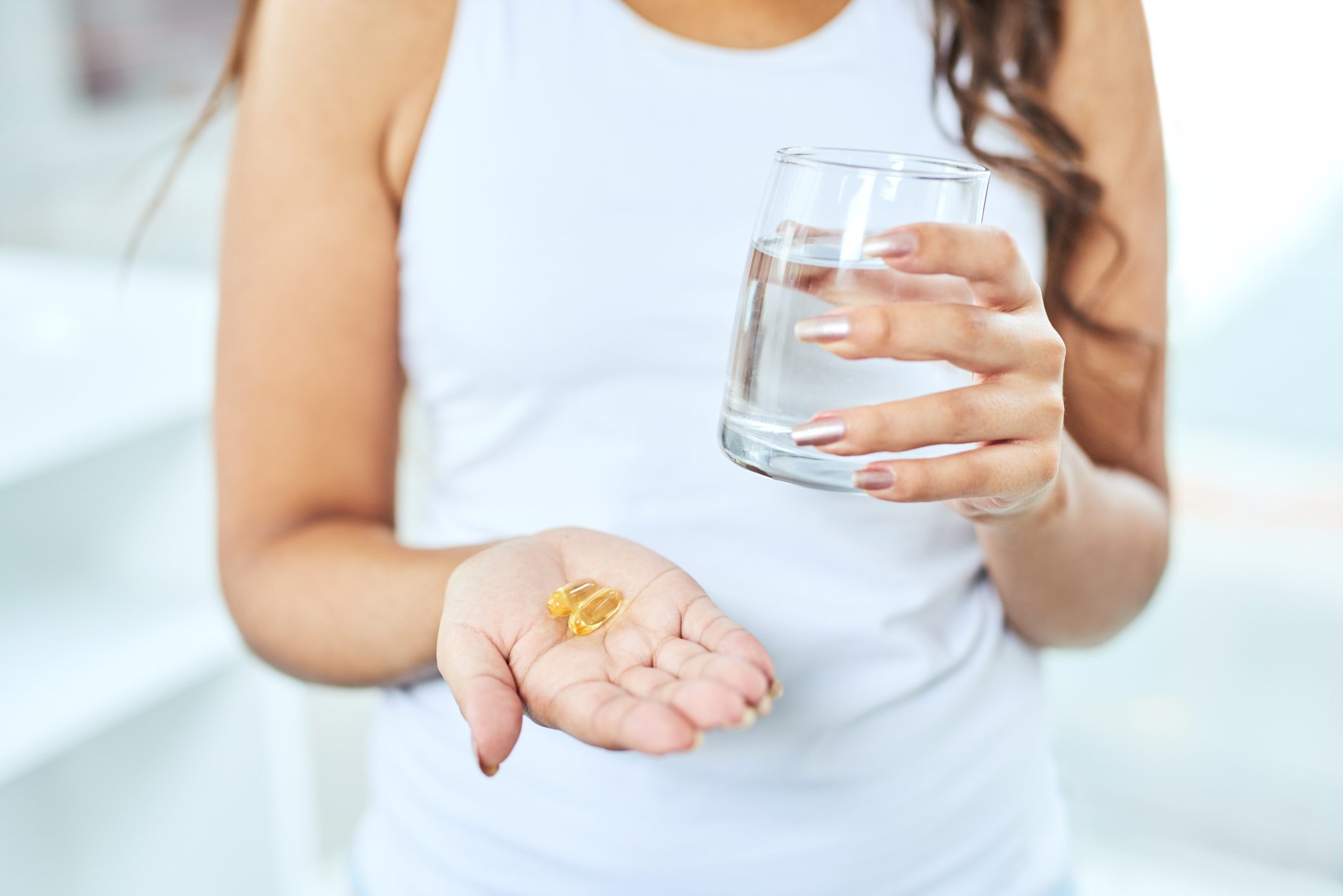Even with a well-designed diet, you may not be getting optimal nutrition. Studies show that food alone may not provide sufficient micronutrients to prevent deficiencies.1
A solid supplement foundation is key to unlocking your health’s full potential. By choosing nutrients that cover a broad spectrum of your body’s needs, you set yourself up for sustained energy, sharper focus, and a better ability to tackle daily challenges.
I am often asked what my supplement routine looks like, so I’m sharing exactly what I take every day to thrive, excel, and navigate life through my 60s and beyond.
Morning Workout Fuel: Key Nutrients
Starting my day with a morning workout is non-negotiable; it’s my secret to activating my body and sharpening my mind. I do resistance training and HIIT sessions throughout the week. My strength routine consists of body-weight exercises and weight lifting, targeting different muscle groups to build strength, improve bone density, rev up my metabolism, and get the many other benefits of building and maintaining muscle.
I always have electrolytes and amino acids, which have become game-changers during my workouts.
Electrolytes
I’ve learned that staying hydrated isn’t just about drinking water; it’s about maintaining the right balance of minerals. That’s why I drink electrolytes during my workout. Electrolytes are minerals that carry an electric charge when dissolved in fluid. They include sodium, potassium, calcium, magnesium, chloride, and phosphate.
These minerals play crucial roles in various bodily functions, including how nerves communicate with each other, muscle contraction, and fluid balance.2 Sweat can deplete electrolyte levels during exercise, especially during intense sessions of resistance training or HIIT.3
Supplementing with electrolytes helps replenish these essential minerals. A good electrolyte formula can help improve hydration, prevent muscle cramps, enhance muscle function, and promote overall performance and recovery.4
I use a comprehensive blend in ElectroReplenish that combines these electrolytes with other nutrients. They include D-ribose to support post-exercise recovery and energy levels, taurine for electrolyte balance, and the antioxidant anti-inflammatory boost of vitamin C, quercetin, and citrus bioflavonoids.*
Amino Acids
Amino acids are the building blocks of protein, essential for muscle health as they help build and repair muscle tissue, support muscle growth, and prevent muscle breakdown.5 They fall into two categories: essential and non-essential. Your body cannot make essential amino acids, so you must get them from food or supplements.
Free-form amino acids like in Amino Power Powder are a type of supplement that provides all nine essential amino acids in their correct ratios. Unlike complete protein, free-form amino acids don’t require digestion, so your muscles can quickly use them.6 These rapidly absorbable amino acids optimize muscle health and support rapid recovery and growth.*
Post-Wakeup Power Smoothie: Fueling Up for the Day
My first real meal of the day is a loaded smoothie, which I drink about two hours after I wake up. Here’s what I add to it:
- Bone broth protein: For years, I searched for a non-dairy protein powder that incorporated whey’s creaminess and impressive amino-acid profile. I finally found it with beef peptides. This type of protein is rich in the essential amino acids crucial for muscle building and repair, especially when you combine it with resistance training.7*
- Collagen: Beef protein powder contains amino acids like glycine, proline, and hydroxyproline that help build collagen. Even so, adding extra collagen to my loaded smoothie ensures I get its many benefits. Collagen improves my skin’s elasticity, strengthens my joints, boosts bone health, promotes gut wellness, and even helps my hair and nails grow stronger and healthier.*8
- Fiber: Fiber is my digestive system’s best friend. It keeps things moving smoothly, helps me feel full longer, normalizes my cholesterol, and keeps my blood-sugar levels steady.9 Fiber can also help eliminate toxins, bind and remove excess hormones like estrogen, and nourish my gut microbiome.10-12 Unlike other fiber products, Extra Fiber provides 12 types of soluble and insoluble fiber from fruits, vegetables, roots, seeds, and tree extracts. They include prebiotics to support the growth of healthy gut bacteria.*
- Creatine: Creatine is my ultimate ally for elevating muscle strength and cognitive function. It’s a powerhouse that turbocharges my energy and accelerates recovery around my workout. Creatine plays a critical role in adenosine triphosphate (ATP) production, which serves as the primary energy carrier in cells, including muscle cells. It also helps regenerate ATP and energy levels during high-intensity, short-duration activities like weightlifting.13 I can go harder and longer at the gym with a good creatine supplement, and it also supports my physical and mental abilities all day.*
Strategic Supplements With My Meals
At my first meal of the day, I strategically include supplements to ensure I’m supporting my body’s needs. Taking supplements with a meal mimics the natural process of nutrient intake through food, which can improve your ability to use the nutrients effectively. Also, fat-soluble vitamins (A, D, E, and K) are best absorbed when taken with a meal that contains fat, so taking them alone won’t be as effective. Here’s what I take every day:
Daily Multivitamin
A multivitamin isn’t just a safety net; it’s a key part of my everyday diet. It ensures I get all the vitamins and minerals I might miss out on, offering a wide range of nutrients. .
Due to numerous factors, including stress, nutrient depletion in soil from modern agricultural practices, and absorption interference by certain medications, taking a multivitamin can help fill nutritional gaps and ensure adequate intake of essential vitamins and minerals.
A multivitamin protects my cells from damage, helps turn food into energy, and keeps my bones strong and healthy. Research shows that taking a multivitamin can boost your immune system, support your brain, and even lower your risk of disease.14-16
Omega-3 Fatty Acids
Even though I eat wild-caught fish several times every week, I supplement with fish oil to make sure I get omega-3s in optimal amounts. Here’s why:
- Omega-3s are vital for cardiovascular health, reducing the risk of heart disease17
- Omega-3s enhance brain function and memory18
- Omega-3s offer lubrication and minimize discomfort in joints19
- Omega-3s help stabilize emotions because they help manage mood-regulating neurotransmitters like serotonin and dopamine20
- The anti-inflammatory properties of omega-3s keep chronic inflammation (a culprit in nearly every disease) in check21
Not all fish-oil supplements are created equally. Many inferior brands have low amounts of EPA and DHA, the two primary omega-3s. My fish-oil supplement, Omega Plus, contains 1g of EPA and DHA in every softgel.*
Vitamin D
Vitamin D is fundamental for bone health, immune system function, mood regulation, and managing inflammation.22-25
Vitamin D is a fat-soluble vitamin that dissolves in fat or oil rather than water. Your body stores these vitamins in fat tissues and the liver for long periods. Fat-soluble vitamins require dietary fat to be absorbed well, meaning you should take vitamin D with a fat-containing meal. (On the other hand, water-soluble vitamins such as B-complex vitamins and vitamin C dissolve in water, so those can be taken alone. Your body does not store water-soluble vitamins.)
For your body to use the fat-soluble vitamin D properly, especially when taken in high amounts, you need vitamin K. Vitamin K guides calcium to your bones and teeth, where it’s needed, and keeps it from building up in soft tissues, where it can cause issues.26 In other words, vitamin D helps your body absorb more calcium, and vitamin K ensures the calcium gets put to good use. Vitamin K also plays a role in activating proteins for blood clotting and keeping your bones healthy.27
Look for a supplement with therapeutic amounts of both vitamins. Vitamin D Plus combines 5,000 IU (125 mcg) of vitamin D with vitamin K and geranylgeraniol for superior availability and absorption.*
Digestive Enzymes
My strategy for lunch and dinner is straightforward but impactful: I eat protein first, aiming for 30-50 g of clean, lean protein with each meal. My go-to sources include wild-caught fish, pasture-raised chicken, or grass-fed beef.
Getting optimal protein is only half the battle. Absorbing it well is equally important. Aging and stress can make it harder for you to produce the digestive enzymes that help break down your food into digestible particles.28
To support protein breakdown, I take Protein First Enzymes about 15 minutes before my meals. These enzymes are key for efficiently breaking down not just protein, but also fats and carbohydrates, ensuring I get the most out of every meal regarding nutrient absorption. It also includes betaine HCl to optimize stomach acidity and improve the digestive process.
This unique blend of enzymes and betaine HCl has been a game-changer for me in reducing common digestive issues like gas, bloating, and irregularity, making meals more enjoyable and comfortable. I don’t go anywhere without them!

A Protein-First Meal Plan Helps You Optimize These Nutrient Benefits
I always get a minimum of 30 grams of protein at every meal. I want you to aim that high, too. My 7-Day Eat Protein First Challenge shows you exactly how easy this simple shift can be—with big benefits for your cravings, energy levels, body composition, and more.
I want you to experience firsthand the many benefits of getting optimal protein, and the 7-Day Eat Protein First Challenge contains everything you need to get started or uplevel your current intake.
It’s FREE, so join the challenge here.
References:
- Misner B. Food alone may not provide sufficient micronutrients for preventing deficiency. J Int Soc Sports Nutr. 2006 Jun 5;3(1):51-5. doi: 10.1186/1550-2783-3-1-51. PMID: 18500963; PMCID: PMC2129155.
- Shrimanker I, Bhattarai S. Electrolytes. [Updated 2023 Jul 24]. In: StatPearls [Internet]. Treasure Island (FL): StatPearls Publishing; 2024 Jan-. Available from: https://www.ncbi.nlm.nih.gov/books/NBK541123/#
- Baker LB. Sweating Rate and Sweat Sodium Concentration in Athletes: A Review of Methodology and Intra/Interindividual Variability. Sports Med. 2017 Mar;47(Suppl 1):111-128. doi: 10.1007/s40279-017-0691-5. PMID: 28332116; PMCID: PMC5371639.
- Verywell Fit: 5 Benefits of Electrolyte Drinks
- Cleveland Clinic: Amino Acid: Benefits & Food Sources
- Azhar G, Wei JY, Schutzler SE, Coker K, Gibson RV, Kirby MF, Ferrando AA, Wolfe RR. Daily Consumption of a Specially Formulated Essential Amino Acid-Based Dietary Supplement Improves Physical Performance in Older Adults With Low Physical Functioning. J Gerontol A Biol Sci Med Sci. 2021 Jun 14;76(7):1184-1191. doi: 10.1093/gerona/glab019. PMID: 33475727; PMCID: PMC8202157.
- Naclerio F, Seijo M, Larumbe-Zabala E, Earnest CP. Carbohydrates Alone or Mixing With Beef or Whey Protein Promote Similar Training Outcomes in Resistance Training Males: A Double-Blind, Randomized Controlled Clinical Trial. Int J Sport Nutr Exerc Metab. 2017 Oct;27(5):408-420. doi: 10.1123/ijsnem.2017-0003. Epub 2017 May 22. Erratum in: Int J Sport Nutr Exerc Metab. 2021 Jan 1;31(1):92. PMID: 28530448.
- Healthline: Top 8 Benefits of Collagen
- Harvard: Fiber
- Gaskins AJ, Mumford SL, Zhang C, Wactawski-Wende J, Hovey KM, Whitcomb BW, Howards PP, Perkins NJ, Yeung E, Schisterman EF; BioCycle Study Group. Effect of daily fiber intake on reproductive function: the BioCycle Study. Am J Clin Nutr. 2009 Oct;90(4):1061-9. doi: 10.3945/ajcn.2009.27990. Epub 2009 Aug 19. PMID: 19692496; PMCID: PMC2744625.
- Fu J, Zheng Y, Gao Y, Xu W. Dietary Fiber Intake and Gut Microbiota in Human Health. Microorganisms. 2022 Dec 18;10(12):2507. doi: 10.3390/microorganisms10122507. PMID: 36557760; PMCID: PMC9787832.
- Kurosawa Y, Hamaoka T, Katsumura T, Kuwamori M, Kimura N, Sako T, Chance B. Creatine supplementation enhances anaerobic ATP synthesis during a single 10 sec maximal handgrip exercise. Mol Cell Biochem. 2003 Feb;244(1-2):105-12. PMID: 12701817.
- Barringer TA, Kirk JK, Santaniello AC, Foley KL, Michielutte R. Effect of a multivitamin and mineral supplement on infection and quality of life. A randomized, double-blind, placebo-controlled trial. Ann Intern Med. 2003 Mar 4;138(5):365-71. doi: 10.7326/0003-4819-138-5-200303040-00005. PMID: 12614088.
- Grima NA, Pase MP, Macpherson H, Pipingas A. The effects of multivitamins on cognitive performance: a systematic review and meta-analysis. J Alzheimers Dis. 2012;29(3):561-9. doi: 10.3233/JAD-2011-111751. PMID: 22330823.
- McKay DL, Perrone G, Rasmussen H, Dallal G, Hartman W, Cao G, Prior RL, Roubenoff R, Blumberg JB. The effects of a multivitamin/mineral supplement on micronutrient status, antioxidant capacity and cytokine production in healthy older adults consuming a fortified diet. J Am Coll Nutr. 2000 Oct;19(5):613-21. doi: 10.1080/07315724.2000.10718959. PMID: 11022875.
- Jain AP, Aggarwal KK, Zhang PY. Omega-3 fatty acids and cardiovascular disease. Eur Rev Med Pharmacol Sci. 2015;19(3):441-5. PMID: 25720716.
- Verywell Health: Fish Oil for Arthritis and Joint Pain: Can It Help?
- Harvard Health: Omega-3 fatty acids for mood disorders
- Zivkovic AM, Telis N, German JB, Hammock BD. Dietary omega-3 fatty acids aid in the modulation of inflammation and metabolic health. Calif Agric (Berkeley). 2011 Jul;65(3):106-111. doi: 10.3733/ca.v065n03p106. PMID: 24860193; PMCID: PMC4030645.
- Laird E, Ward M, McSorley E, Strain JJ, Wallace J. Vitamin D and bone health: potential mechanisms. Nutrients. 2010 Jul;2(7):693-724. doi: 10.3390/nu2070693. Epub 2010 Jul 5. PMID: 22254049; PMCID: PMC3257679.
- Aranow C. Vitamin D and the immune system. J Investig Med. 2011 Aug;59(6):881-6. doi: 10.2310/JIM.0b013e31821b8755. PMID: 21527855; PMCID: PMC3166406.
- Akpınar Ş, Karadağ MG. Is Vitamin D Important in Anxiety or Depression? What Is the Truth? Curr Nutr Rep. 2022 Dec;11(4):675-681. doi: 10.1007/s13668-022-00441-0. Epub 2022 Sep 13. PMID: 36097104; PMCID: PMC9468237.
- Yin K, Agrawal DK. Vitamin D and inflammatory diseases. J Inflamm Res. 2014 May 29;7:69-87. doi: 10.2147/JIR.S63898. PMID: 24971027; PMCID: PMC4070857.
- Healthline: Is Vitamin D Harmful Without Vitamin K?
- ScienceDirect: Vitamin K – an overview
*These statements have not been evaluated by the Food & Drug Administration. Products mentioned are not intended to diagnose, treat, cure, or prevent any disease. The views in this blog by JJ Virgin should never be used as a substitute for professional medical advice. Please work with a healthcare practitioner concerning any medical problem or concern.






